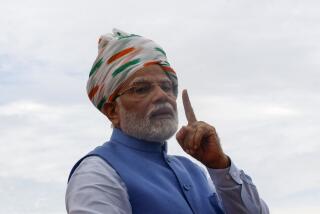CENSORSHIP DISPUTE MARS BBC IMAGE
- Share via
LONDON — A dispute over government interference in the British Broadcasting Corp. has tarnished the BBC’s reputation for independent and unbiased reporting, media observers say.
The dispute, over a television documentary involving a reputed Irish guerrilla leader, has cast a shadow over the freedom of broadcasting in Britain.
The board of governors of the BBC, which is funded by a license fee fixed and collected by the state, precipitated the dispute by banning the documentary’s screening after a request from Prime Minister Margaret Thatcher and her government.
Journalists at the BBC responded angrily by accusing the government of trying to censor the corporation. They plan a 24-hour nationwide news blackout protest Wednesday.
They also accused the board of governors of bowing to blatant political pressure and failing to ensure the independence of the corporation.
Some senior BBC managers have also criticized the decision and publicly acknowledged that, in the short term at least, the corporation’s reputation abroad will suffer.
Austen Kark, managing director of the BBC external services, said on radio that foreign critics of the BBC--the Soviet Union or Libya, for example--were using the episode to back claims that the BBC was a tool of the British government. “It has made it very difficult in the short run,” Kark said.
The controller of the BBC in Northern Ireland, James Hawthorne said: “This is all about decent journalism. This is the right to cover Northern Ireland stories fairly and realistically.”
The government called for the banning of the program in a letter from Home Secretary Leon Brittan to BBC Chairman Stuart Young. It argued that the program would support guerrillas fighting to end British rule in Northern Ireland.
It denies putting undue pressure on the BBC, saying it had simply expressed its misgivings.
Thatcher is the driving force behind a campaign for a voluntary code of conduct to deny guerrilla organizations worldwide what she calls the oxygen of publicity.
The incident has dominated much of the British press.
More to Read
Sign up for Essential California
The most important California stories and recommendations in your inbox every morning.
You may occasionally receive promotional content from the Los Angeles Times.










